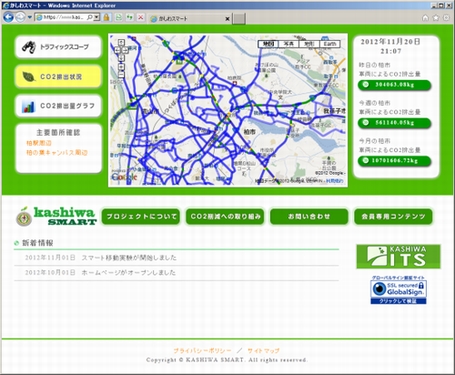March 29, 2013
Tokyo University Researches Impact of Eco-Info Campaign on Peoples' Travel Choices
Keywords: Transportation / Mobility University / Research institute
The Institute of Industrial Science at the University of Tokyo announced on December 5, 2012, the launch of a social experiment in Kashiwa, Chiba Prefecture, designed to assess the changes in citizens' travel behavior after being provided information such as the carbon dioxide (CO2) emissions related to their commuting habits. The experiment is designed to evaluate their response to campaigns that urge them to make more environmentally friendly transportation choices, using a social feedback system the Institute has developed and improved for more practical use. Under the system, citizens are provided with easy-to-understand information that could affect their daily transportation behavior -- such as real-time traffic conditions and the environmental impacts of their travel choices -- utilizing information technologies.
Two kinds of methods are being used for this experiment. One is the "probe-person" survey method, where participating residents in Kashiwa -- which has been designated by the government as a model city for verification experiments of intelligent transport systems -- install a dedicated delivery application on their personal information devices. Their mobile history is collected with the help of several functions included in the application such as a global positioning system (GPS). The other method being used is an online questionnaire survey to quantify the range of citizens' traffic behavior changes.
CO2 emissions originating from road traffic account for a little less than 20 percent of total CO2 emissions, and any reduction is limited to measures for vehicles or drivers. Therefore, a system is needed by which ordinary citizens, including non-drivers, are encouraged to change how they travel and to become more environmentally conscious.
The Institute intends to expand the reach of the experiment by improving the system, and it aims to achieve an evaluation on topics such as participants' travel behavior changes and effects on reduction in CO2 emissions, both triggered by information delivered, use of the system by citizens, social benefits, economic feasibility, and accuracy of the system.
Related
"JFS Newsletter"
- Auto Sales Industry Cooperates to Tackle Social Responsibility: Examples from Yamagata, Japan
- 'Community Car Sharing' Supports the Bond of Mutual Aid
- Resident-Led Efforts to Secure Local Public Transport Systems
- Buy Flowers Downtown and Ride the Train for Free? A Look at Toyama's Creative Approaches to Being a Vibrant City in a Time of Depopulation
Related
"Popular Articles"
- Kakegawa Declares Itself a "Slow Life City"
- Car Ownership Rate for Japanese Households Decreases
- Toyama City Works Toward Compact City Utilizing Public Transportation
- Kanagawa Pref. Announces Concept Vehicle for Electric Bus with Low, Full Flat Floor
- Kyoto Tackles Mission of Becoming World-Class Bike-Friendly City



